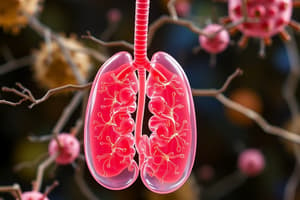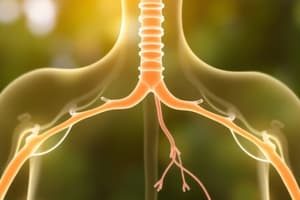Podcast
Questions and Answers
What is the primary purpose of studying the respirasome?
What is the primary purpose of studying the respirasome?
- Investigating the impact of CO2 levels on respiration
- Providing information for drug design and screening (correct)
- Understanding the carbon balance in plants
- Enhancing plant growth through targeted interventions
Why is there variability in the response of dark leaf respiration to elevated CO2 levels?
Why is there variability in the response of dark leaf respiration to elevated CO2 levels?
- Decrease in photosynthetic activity
- Carbon balance in the whole plant (correct)
- Changes in plant morphology
- Increased availability of water
How do elevated CO2 levels impact respiration in plants according to the text?
How do elevated CO2 levels impact respiration in plants according to the text?
- Dilution of nitrogen (correct)
- Increase in water uptake
- Reduced sugar production
- Enhanced availability of light
What is the biological significance of respiration as mentioned in the text?
What is the biological significance of respiration as mentioned in the text?
What is the relationship between respiration and overall health of living organisms?
What is the relationship between respiration and overall health of living organisms?
Why is further research needed on the impact of CO2 levels on respiration according to the text?
Why is further research needed on the impact of CO2 levels on respiration according to the text?
What is the main purpose of respiration in living organisms?
What is the main purpose of respiration in living organisms?
Which type of respiration occurs in the absence of oxygen?
Which type of respiration occurs in the absence of oxygen?
What are the end products of aerobic respiration?
What are the end products of aerobic respiration?
Which molecular machine carries out cellular respiration?
Which molecular machine carries out cellular respiration?
What process does anaerobic respiration use to produce energy?
What process does anaerobic respiration use to produce energy?
Which of the following is NOT a step in aerobic respiration?
Which of the following is NOT a step in aerobic respiration?
Flashcards are hidden until you start studying
Study Notes
Respiration
Overview
Respiration is a vital biological process that occurs in all living organisms, including plants, animals, and humans. It serves the purpose of releasing energy required for life-sustaining activities. This process can occur in the presence or absence of oxygen and involves the conversion of food molecules into energy.
Types of Respiration
There are two main types of respiration:
Aerobic Respiration
Aerobic respiration is the process of cellular respiration that takes place in the presence of oxygen. This type of respiration is common in most plants and animals, including humans. Aerobic respiration produces water and carbon dioxide as end products. It is a complex process that involves multiple steps, including glycolysis, the citric acid cycle (also known as the Krebs cycle), and the electron transport chain, where oxidative phosphorylation occurs.
Anaerobic Respiration
Anaerobic respiration, on the other hand, is a process that takes place in the absence of oxygen. This type of respiration is less efficient than aerobic respiration and produces energy by the breakdown of glucose without oxygen. Examples of anaerobic respiration include fermentation in yeast.
Respirasome
The respirasome is a huge molecular machine that carries out cellular respiration. Its structure and function have been studied extensively, providing valuable insights into the organization of the respiratory chain. The study of the respirasome has renewed our understanding of the respiratory chain organization and has provided important information for drug design and screening.
Cellular Respiration in Plants
In plants, cellular respiration involves the conversion of glucose into energy and is influenced by the presence of oxygen. The response of dark leaf respiration (Rd) to elevated CO2 levels is a subject of debate, with some reports indicating a decrease in Rd, while others show an increase or no change. This variability may be due to the carbon balance in the whole plant, with 20-80% of the carbon fixed in photosynthesis being released again through respiration.
Impact of CO2 Levels on Respiration
Elevated CO2 levels have been shown to affect the respiration process in plants, with some studies suggesting that increasing CO2 levels may enhance or reduce Rd. These changes are attributed to the increased availability of respiratory substrates (such as sugar) or the dilution of nitrogen caused by elevated CO2. Further research is needed to understand the mechanisms behind these effects and their implications for plant growth and adaptation to changing environmental conditions.
Biological Significance of Respiration
Respiration is a fundamental process that plays a crucial role in maintaining the balance of energy and nutrients within organisms. It is essential for the survival and growth of all living organisms and is directly related to the overall health and well-being of the organism. Understanding the processes of respiration, including the role of various components and factors, is essential for developing targeted interventions and strategies to improve overall health and mitigate the impact of environmental changes on plant and animal populations.
Studying That Suits You
Use AI to generate personalized quizzes and flashcards to suit your learning preferences.




